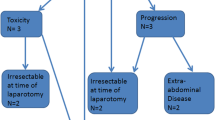Abstract
Purpose
The prognosis of peritoneal carcinomatosis (PC) from colorectal cancer has been improved with cytoreductive surgery (CRS) and hyperthermic intraperitoneal chemotherapy (HIPEC). However, benefits of postoperative chemotherapy (CT) are unclear.
Methods
This retrospective, multicenter study included 231 patients treated by CRS and HIPEC for isolated PC of colon cancer in four expert’s centers. Overall survival (OS), progression-free survival (PFS), and peritoneal recurrence-free survival (PRFS) were compared between patients with adjuvant CT (started within 3 months after surgery) and patients with surveillance only.
Results
After exclusion of 10 patients for early postoperative death (4 %), 221 patients were included (CT group: n = 151; surveillance group: n = 70). Main postoperative CT regimens (median of 6 cycles) were Folfox (28 %), Folfiri bevacizumab (24.5 %), Folfiri (16 %), and Folfiri cetuximab (12.5 %). The median OS after surgery was 43.3 months with no difference between CT and surveillance groups. In multivariate analysis, a low peritoneal cancer index (p < 0.0001) and a long delay between diagnosis of CP and HIPEC (p = 0.001) were associated with increased OS. The median PFS and PRFS were 12.4 and 17 months, respectively. At 1 year, more patients were without progression (p = 0.001) or PC recurrence (0.0004) in the CT group, but with prolonged follow-up this difference was no longer significant.
Conclusions
Early postoperative CT does not improve OS after CRS and HIPEC for colon carcinomatosis. However, a transient effect on PFS and PRFS was observed. A subgroup of patients who may benefit more from CT remain to be defined.


Similar content being viewed by others
References
Ferlay J, Parkin DM, Steliarova-Foucher E. Estimates of cancer incidence and mortality in Europe in 2008. Eur J Cancer. 2010;46:765–81.
Chu DZ, Lang NP, Thompson C, Osteen PK, Westbrook KC. Peritioneal carcinomatosis in nongynecologic malignancy. A prospective study of prognostic factors. Cancer. 1989;63:364–7.
Sadeghi B, et al. Peritoneal carcinomatosis from non-gynecologic malignancies. Cancer. 2000;88:358–63.
Jayne DG, Fook S, Loi C, Seow-Choen F. Peritoneal carcinomatosis from colorectal cancer. Br J Surg. 2002;89:1545–50.
Pelz JO, et al. Evaluation of best supportive care and systemic chemotherapy as treatment stratified according to the retrospective peritoneal surface disease severity score (PSDSS) for peritoneal carcinomatosis of colorectal origin. BMC Cancer. 2010;10:689.
Sugarbaker PH. Peritonectomy procedures. Ann. Surg. 1995;221:29–42.
Sugarbaker PH, et al. Early postoperative intraperitoneal chemotherapy as an adjuvant therapy to surgery for peritoneal carcinomatosis from gastrointestinal cancer: phgroupacological studies. Cancer Res. 1990;50:5790–4.
Verwaal VJ, et al. Randomized trial of cytoreduction and hyperthermic intraperitoneal chemotherapy versus systemic chemotherapy and palliative surgery in patients with peritoneal carcinomatosis of colorectal cancer. J Clin Oncol. 2003;21:3737–43.
Elias D, et al. Peritoneal colorectal carcinomatosis treated with surgery and perioperative intraperitoneal chemotherapy: retrospective analysis of 523 patients from a multicentric French study. J Clin Oncol. 2010;28:63–8.
Glehen O, et al. Cytoreductive surgery combined with perioperative intraperitoneal chemotherapy for the management of peritoneal carcinomatosis from colorectal cancer: a multi-institutional study. J Clin Oncol. 2004;22:3284–92.
Elias D, et al. Prognostic similarities and differences in optimally resected liver metastases and peritoneal metastases from colorectal cancers. Ann Surg. 2015;261:157–63.
Passot G, et al. Progression following neoadjuvant systemic chemotherapy may not be a contraindication to a curative approach for colorectal carcinomatosis. Ann Surg. 2012;256:125–9.
Baumgartner JM et al. (2014) Predictors of progression in high-grade appendiceal or colorectal peritoneal carcinomatosis after cytoreductive surgery and hyperthermic intraperitoneal chemotherapy. Ann. Surg. Oncol. 22:1–6.
Chua TC, et al. Influence of modern systemic therapies as adjunct to cytoreduction and perioperative intraperitoneal chemotherapy for patients with colorectal peritoneal carcinomatosis: a multicenter study. Ann Surg Oncol. 2011;18:1560–7.
Mitry E, et al. Adjuvant chemotherapy after potentially curative resection of metastases from colorectal cancer: a pooled analysis of two randomized trials. J Clin Oncol. 2008;26:4906–11.
Nordlinger B et al. Perioperative chemotherapy with FOLFOX4 and surgery versus surgery alone for resectable liver metastases from colorectal cancer (EORTC Intergroup trial 40983): a randomised controlled trial. Lancet 2008;371:1007–1016.
Allegra CJ, et al. Phase III Trial assessing bevacizumab in stages II and III carcinoma of the colon: results of NSABP Protocol C-08. J Clin Oncol. 2011;29:11–6.
de Gramont A, et al. Bevacizumab plus oxaliplatin-based chemotherapy as adjuvant treatment for colon cancer (AVANT): a phase 3 randomised controlled trial. Lancet Oncol. 2012;13:1225–33.
Taieb J, et al. Oxaliplatin, fluorouracil, and leucovorin with or without cetuximab in patients with resected stage III colon cancer (PETACC-8): an open-label, randomised phase 3 trial. Lancet Oncol. 2014;15:862–73.
Passot G et al. (2014) Pathological response to neoadjuvant chemotherapy: a new prognosis tool for the curative management of peritoneal colorectal carcinomatosis. Ann Surg Oncol. 21:1–7.
Acknowledgments
The authors thank Isabelle Bonnefoy for all the help provided during the study.
Conflict of interest
The authors declared no conflict of interest of any kind for this study.
Author information
Authors and Affiliations
Consortia
Corresponding author
Rights and permissions
About this article
Cite this article
Maillet, M., Glehen, O., Lambert, J. et al. Early Postoperative Chemotherapy After Complete Cytoreduction and Hyperthermic Intraperitoneal Chemotherapy for Isolated Peritoneal Carcinomatosis of Colon Cancer: A Multicenter Study. Ann Surg Oncol 23, 863–869 (2016). https://doi.org/10.1245/s10434-015-4914-4
Received:
Published:
Issue Date:
DOI: https://doi.org/10.1245/s10434-015-4914-4




